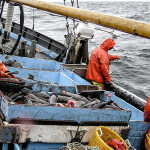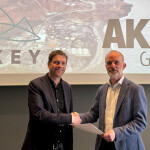Farmed abalone is gradually growing in popularity in high end restaurants in Europe, thanks to the efforts of France Haliotis, based in Brittany, in the northwest of the country.
This company operates the largest abalone farm in Europe and is the only one to farm the local species, Haliotis tuberculate. Known as the European abalone, it differs from the more commonly grown Japanese abalone in size, taste and texture.
Sylvain Huchette founded France Haliotis ten years ago, after researching them for his PhD in Australia, and had big ambitions to produce large quantities and make his fortune.
“It didn’t turn out quite as expected, as the vagaries of farming off the Brittany coast became obvious, but we are making good progress now,” he explained.
“We are currently producing around 6 metric tons (MT) each year, working towards 10 MT, and aiming much higher,” he said. “We also manage to achieve GBP 65 (USD 103.48, EUR 81.83) per kilo, compared to GBP 25 (USD 39.80, EUR 31.47) per kilo for wild stock.”
France Halitosis currently has customers in France, Belgium, Germany, Italy, Spain and Switzerland, and Sylvain is keen to see his abalone feature on more high-class menus in Europe. “We sell to El Bulli in Barcelona, Le Cinq at the Hotel Four Seasons George V in Paris and L'auberge de l'Ill, at l'Illhausen in Alsace amongst others, and are working hard to spread the word about our great product,” Huchette said.
The farmed abalone start life in a hatchery built close to the shore, where broodstock are spawned in June and July. Unlike other shellfish species, which have complex feeding needs at an early stage, abalone larvae start grazing on algae growing on thin plastic sheets, from their fourth day. At this stage the tiny shellfish are moved to a 110-tank outdoor nursery, supplied with a constant flow of seawater, and obtain nourishment from seaweed seeded into the tanks.
For the past 10 years, all the broodstock have come from the local wild population, but Huchette has just started a selective breeding program to improve performance and reduce the time to harvest, which is currently 3-4 years.
At a year old, abalone are moved out to sea and kept in large cages, which sit on the seabed attached to subsurface longlines. Once a month the cages are filled with freshly harvested seaweed of different types, which ensures their diet mimics that obtained in the wild.
In 2012 Ecocert Organic Agriculture granted the farm organic certification, which Huchette has found to be an excellent marketing tool.
When ready for harvest, the abalone are taken ashore, graded for size, and placed in holding tanks. Careful handling at this stage is very important to minimize stress and maintain them in good condition.
“In summer we harvest to meet demand but in winter we tend to hold stock ashore in advance, to ensure we can meet orders whatever the weather,” he said.
The abalone are packed into specially designed containers, sent by 24-hour courier, and guaranteed to arrive alive.
“Initially this caused us some problems because the chefs were not used to dealing with a live animal, but we have done a lot of work educating them on handling, preparation and cooking methods, and they appreciate our knowledge and efforts. We have also had to change the way that chefs order, impressing on them that they need to contact us 2 to 3 days in advance,” explained Huchette.
The company also offers wild abalone, but most chefs, and certainly those working in high-end restaurants have expressed a preference for the reliability of France Haoliotis’ superior farmed product, which is consistent in terms of size, texture and quality.
“Provenance and history are also important to top chefs and our abalone come with a great story,” he said.
Hundreds of visitors, including chefs, scientists and the general public, are welcomed to the hatchery each year, where they are introduced to the delights of abalone. Huchette enjoys giving talks and preparing tastings, and his enthusiasm for his subject comes across loud and clear.
“It’s good to have passion and chefs recognize and appreciate that when you are talking to them,” he stated.
In terms of global production, France Haliotis is a very small (shell)fish. In 2012, according to FAO figures, global farmed production of abalone species was around 85,000 MT, while the wild catch was just over 108,000 MT. However, Huchette believes that his company’s growing expertise will see it become a much bigger player in the future.






